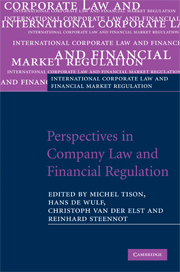Book contents
- Frontmatter
- Contents
- List of contributors
- Foreword
- PART I Perspectives in company law, SECTION 1: European company law: regulatory competition and free movement of companies
- PART 1 Perspectives in company law, SECTION 2: Corporate governance, shareholders' rights and auditing
- PART 1 Perspectives in company law, SECTION 3: Takeover law
- PART II Perspectives in financial regulation, SECTION 1: European perspectives
- PART 2 Perspectives in financial regulation, SECTION 2: Transatlantic perspectives
- PART III Miscellaneous
- 33 The practitioner and the professor – is there a theory of commercial law?
- 34 A short paean for Eddy: Clever, Wise, August, Funny and European
- Index
33 - The practitioner and the professor – is there a theory of commercial law?
from PART III - Miscellaneous
Published online by Cambridge University Press: 04 August 2010
- Frontmatter
- Contents
- List of contributors
- Foreword
- PART I Perspectives in company law, SECTION 1: European company law: regulatory competition and free movement of companies
- PART 1 Perspectives in company law, SECTION 2: Corporate governance, shareholders' rights and auditing
- PART 1 Perspectives in company law, SECTION 3: Takeover law
- PART II Perspectives in financial regulation, SECTION 1: European perspectives
- PART 2 Perspectives in financial regulation, SECTION 2: Transatlantic perspectives
- PART III Miscellaneous
- 33 The practitioner and the professor – is there a theory of commercial law?
- 34 A short paean for Eddy: Clever, Wise, August, Funny and European
- Index
Summary
Of course, my title indicates a reverence to Eddy Wymeersch. He has shown that in commercial law both practical and theoretical functions of a highest level can be united in one person. And the lesson he teaches goes one step further: he certainly did not undertake all the burdens simply for honours, but because he saw a professional need to follow both tracks. Practice requires guidelines from theory and theory the feedback from practice.
But I am hesitating: what exactly does theory offer to commercial practice? In our actual world, is not the flow going more and more the other way in that innovative practice gets faster and faster, and, be it just for the changing allocation of forces, theory slower and slower? The two seem to become increasingly unequal, the one trying breathlessly to run behind the other.
My question has two branches. First, it applies a sociological view on those having to do with commercial law. This is kind of an outward look. Then, the inward look has to follow, i.e. an analysis of the actual state of commercial legal theory, its possible deficits and chances. All that will necessarily be limited to some observations and ideas from one of many possible viewpoints.
But before all, let us start by an example. It will allow a closer view to the problem, and will set more players into the field than the professor and the one applying the law in commercial practice; in particular lawmakers and courts have to come into the picture.
- Type
- Chapter
- Information
- Perspectives in Company Law and Financial Regulation , pp. 607 - 616Publisher: Cambridge University PressPrint publication year: 2009
- 1
- Cited by



